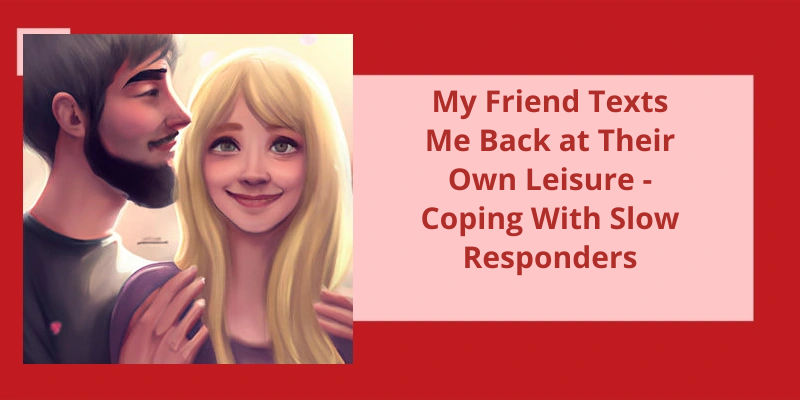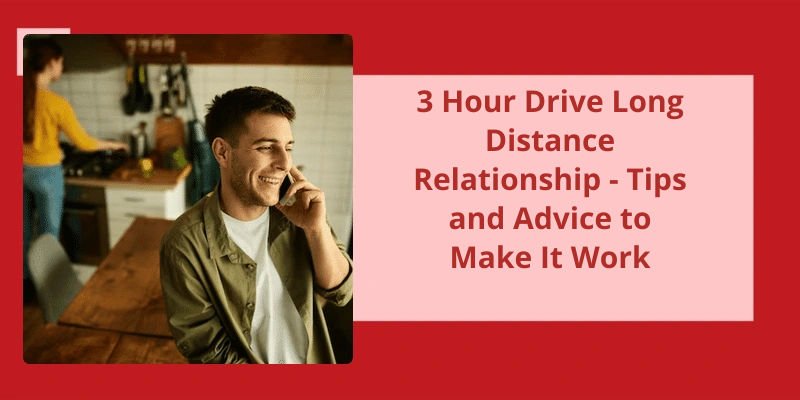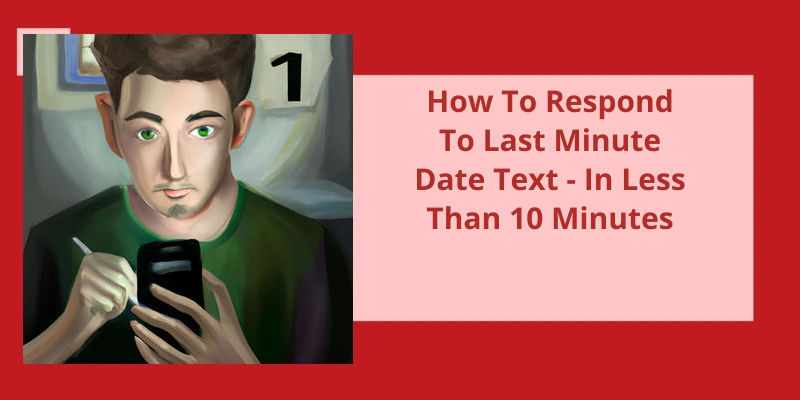As we navigate our increasingly digital world, it's becoming more and more common to communicate with our friends through text messages. While texting has certainly made it easier to keep in touch with those in our social circle, it's also created some new challenges – especially when it comes to response times. We've all been in the position of eagerly waiting for a reply from a friend, only to be left waiting for hours, or even days, at a time. It can be frustrating, but it's important to remember that everyone has their own schedule and priorities. Just because your friend isn't texting you back immediately doesn't mean they don't value your friendship. So, whether you're the one waiting for a response or the one being asked to reply, it's important to approach texting with patience and understanding.
How Long Should You Wait to Text Someone if They Don T Respond?
Effective communication is key in any relationship, especially in todays digital age where texting and messaging have become one of the most common ways for people to connect with each other. However, being left on read or not receiving a response can leave one wondering if they should follow up with another message.
The general rule of thumb is to wait at least 4 hours before texting someone again if they havent responded to your message. This gives the other person ample time to read and respond to your message without feeling pressured or overwhelmed. It also shows that you respect their time and space.
It’s important to note that this waiting period may vary depending on the nature of your relationship and the context of the message. If the message is urgent or time-sensitive, then it may be appropriate to follow up sooner. On the other hand, if it’s a casual conversation or non-urgent matter, waiting a bit longer may be acceptable.
While it’s tempting to keep texting or messaging someone until they respond, it’s important to avoid double texting or sending a wall of text – this can come off as desperate or aggressive. In addition, if the other person sends a lot of messages, it’s important to set boundaries and let them know what’s acceptable and what isnt. Communication is a two-way street, and both parties should feel comfortable and respected in the conversation.
While it can be frustrating to not receive a response, it’s important to approach the situation with empathy and understanding. By respecting the other persons time and boundaries, you can build a healthy and positive relationship based on effective communication.
While texting has become the primary mode of communication for many people, it can be frustrating when your friends don’t respond to your messages. However, it’s important to consider the individual and their behavior before assuming that they’re ignoring you. While some people may always reply to texts, others may not prioritize texting and may take longer to respond. But if someone who used to reply instantly suddenly starts taking a long time to respond, it could be a cause for concern.
Is It Normal for Friends to Not Respond to Texts?
Many people have different communication styles and it’s not uncommon for some friends to not respond to texts. There could be a variety of reasons for this, such as being busy, not seeing the message, or feeling overwhelmed with messages. This can be frustrating for the person sending the text, but it’s important to remember that we all have different priorities and responsibilities.
However, if your friend used to reply quickly and suddenly stopped responding, it may be worth checking in with them. They could be going through something challenging or have other reasons for not wanting to communicate. In this case, it’s important to be respectful and give them space if they need it.
On the other hand, if your friend consistently ignores your texts and doesn’t show any effort to communicate, it might be a sign that they aren’t interested in maintaining the friendship. It’s important to remember that friendships should be a two-way street and require effort from both parties. If you feel like youre constantly putting in the effort and not getting anything in return, it may be time to reevaluate the friendship.
It’s also worth considering the context of the relationship. If youre in a long-distance friendship or have different schedules, it may not be feasible to always respond immediately. However, if youre seeing each other regularly and one person consistently ignores texts, it may be a sign of a larger issue.
Ultimately, communication is key in any relationship. If youre feeling frustrated or upset about a friend not responding to texts, it’s important to have an open and honest conversation about it. This can help clear up any misunderstandings and ensure that both parties are on the same page. It’s normal for friendships to have ups and downs, but with effort and communication, they can often be resolved.
It can be overwhelming when a friend constantly texts you. However, there are some ways to manage the situation without hurting their feelings or causing more stress. By shortening your responses and focusing on one topic at a time, you can maintain a healthy balance in your communication with your friend. Here are some more tips on what to do when a friend keeps texting you.
What to Do When a Friend Keeps Texting You?
It’s also helpful to create boundaries with your friend and communicate them clearly. Let them know that while you appreciate their messages, you may not always have the time or capacity to respond immediately. Encourage them to space out their messages or group them together in a single message.
If your friends constant texting is becoming overwhelming or causing you stress, it may be necessary to have a conversation with them about your boundaries and how their behavior is affecting you. This can be a difficult conversation to have, but it’s important to set clear expectations and ensure that your needs are being met as well.
Encourage them to seek professional help if necessary, and offer your support and understanding as they work through any challenges they may be facing.
Remember to also take care of yourself in this situation. It can be emotionally draining to constantly respond to someone elses messages, especially if they’re negative or demanding. Set aside time for yourself to recharge and focus on your own needs and priorities.
Ultimately, the key to managing a friends constant texting is open and honest communication. By setting clear boundaries, encouraging healthy communication habits, and prioritizing your own well-being, you can maintain a positive and fulfilling friendship with your texting-heavy friend.
How to Determine if a Friend’s Constant Texting Behavior Is Healthy or Unhealthy
There are a few signs to look out for when determining whether a friend’s constant texting behavior is healthy or unhealthy. Healthy behavior includes normal frequency of texts, respectful communication, and avoiding constant demands for attention. Unhealthy behavior includes excessive texting, controlling language, and a need for constant validation. It’s important to maintain open and honest communication with your friend about how their behavior is making you feel and to set healthy boundaries.
As communication through technology becomes more prevalent in modern relationships, it’s even more important to understand the hidden meanings behind our actions. One behavior that can often be overlooked or dismissed is excessive texting. While it may seem harmless, frequent texting can actually reveal deeper issues and emotions within a relationship. In some cases, it may even be a sign of unhealthy attachment or dependency. In this article, we’ll explore the various reasons why someone might engage in excessive texting and what it could potentially mean for the relationship.
What Does Frequent Texting Mean?
Frequent texting is a communication method that’s gained a lot of popularity in recent years. It involves sending multiple texts back and forth, and can be done through a variety of messaging platforms, including SMS, WhatsApp, and Facebook Messenger. While texting provides an easy and convenient way to keep in touch with friends and family, frequent texting can sometimes indicate deeper issues.
Excessive texting is a phenomenon that can be both positive and negative, depending on the situation and context. For others, however, constant texting could be a sign of insecurity, neediness, or even emotional dependence. Such behavior can be harmful, as it can put undue pressure on the other person, leading to a lack of personal space and freedom.
When it comes to romantic relationships, frequent texting can mean different things. Some couples view texting as a way to strengthen their bond, and exchange texts throughout the day, expressing their love and affection for each other. It can also be a sign of someone feeling emotionally neglected or unfulfilled in the relationship, and trying to compensate by seeking constant validation through texting.
Additionally, frequent texting can reveal different types of personalities. For example, a person who texts often may simply be someone who likes to stay connected and keep the conversation flowing. Alternatively, they may be an individual who feels more comfortable expressing themselves through written communication rather than face to face. On the other hand, someone who avoids texting or takes a long time to respond may be introverted or prefer more traditional modes of communication.
It’s important to recognize these signs and communicate openly with the other person to prevent any potential harm to the relationship. Overall, it’s essential to strike a balance between maintaining frequent communication and respecting each other’s boundaries and personal space.
The Psychological and Emotional Effects of Frequent Texting on Individuals
This topic explores how frequent texting can impact a person’s mental and emotional well-being. It delves into how ongoing use of texting can lead to feelings of burnout, anxiety, and isolation. The study focuses on how excessive texting can change communication patterns and adversely affect human relationships.
Source: Understanding the Dynamics of Texting in Relationships
However, it’s important to consider the context of the messages as well as your own comfort level with the frequency of communication. In this article, we’ll explore different scenarios and factors that could be behind a friend texting you every day, and how to navigate those situations.
What Does It Mean When a Friend Texts You Everyday?
It’s important to consider the context of your friendship when deciphering what it means for your friend to text you everyday. Are you both going through a tough time and using each other for support? Or are you simply both very chatty and enjoy keeping in touch throughout the day? These factors can play a big role in the frequency and content of your friends texts.
Another thing to consider is how your friend interacts with other people in their life. Are they generally a social butterfly who keeps in touch with lots of friends, or do they tend to keep their inner circle small and exclusive?
Of course, it’s also possible that your friend is simply bored and looking for someone to talk to on a regular basis. This doesn’t necessarily mean that they don’t value your friendship, but it’s important to recognize that there may be other factors at play beyond just your bond.
Ultimately, the best way to determine what your friends daily texts mean is to ask them directly. This may feel awkward, but it’s better to have a clear understanding of the situation rather than making assumptions based on your own interpretation of their behavior. Be honest and straightforward, and don’t be afraid to bring up any concerns or questions you may have. After all, communication is key in any healthy relationship.
Now that we’ve a clear understanding of what dry texting is and how it’s perceived, let’s explore the reasons why people choose to communicate in this way and how it can affect our relationships.
Is Dry Texting Rude?
Some people argue that dry texting isn’t inherently rude but rather a personal preference or communication style. They believe that it’s possible to be brief and still convey interest or concern. In their eyes, it’s a sign of disengagement and unwillingness to put in effort for the sake of the relationship.
Some people may be more forgiving or understanding, while others may see it as a dealbreaker. It’s important to communicate openly and honestly with the other person about how their behavior is making you feel, and to try to find a compromise or solution that works for both of you.
Conclusion
In today's fast-paced world, communication is key and we all rely on it to stay connected with our loved ones. However, it’s important to understand that everyone has their own priorities and responsibilities that may affect their availability to respond promptly. For instance, friends who’re busy with work or family obligations may not be able to reply to texts immediately. This shouldn’t be seen as an act of disrespect or indifference, but rather an indication that they value your friendship enough to make time for you whenever possible. Therefore, it’s important to give our friends the benefit of doubt and respect their time and space, without being too demanding or clingy. Ultimately, it’s the quality of our interactions that matters the most, and genuine connections are built on mutual trust, understanding, and empathy. So, next time your friend texts you back at their own leisure, remember to appreciate the effort they've made to stay in touch and reciprocate with kindness and gratitude.






